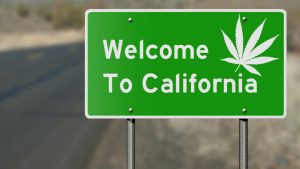 Cannabis legalization inevitably leads states and local governments to at least discuss the impact of cannabis tourism. In your standard legalization regime, adults 21 and older from anywhere in the world can (and absolutely do) come to certain U.S. states to buy and consume cannabis from regulated storefronts whose cannabis products come from regulated cultivators, manufacturers, and (sometimes) distributors. Most state governments have put at least some kibosh on cannabis tourism for fear of incurring the wrath of the federal government. This is why cannabis cups with product on site are on the decline and why we don’t see states rushing to legalize cannabis lounges or clubs. Washington State has pretty much outlawed any form of meaningful cannabis tourism and Colorado has effectively done the same, with a only a few individual cities there pushing for consumption sites/rights under local laws.
Cannabis legalization inevitably leads states and local governments to at least discuss the impact of cannabis tourism. In your standard legalization regime, adults 21 and older from anywhere in the world can (and absolutely do) come to certain U.S. states to buy and consume cannabis from regulated storefronts whose cannabis products come from regulated cultivators, manufacturers, and (sometimes) distributors. Most state governments have put at least some kibosh on cannabis tourism for fear of incurring the wrath of the federal government. This is why cannabis cups with product on site are on the decline and why we don’t see states rushing to legalize cannabis lounges or clubs. Washington State has pretty much outlawed any form of meaningful cannabis tourism and Colorado has effectively done the same, with a only a few individual cities there pushing for consumption sites/rights under local laws.
There is though a bright and shining light at the end of the tunnel when it comes to cannabis tourism — California. With California’s passage of SB 94 (a/k/a the Medicinal and Adult Use Cannabis Regulation and Safety Act), we may actually see cannabis tourism take off and sustain itself here in the Golden State. It certainly does not hurt that cannabis is an entrenched cultural phenomenon here.
In addition to its SB 94-sanctioned event permit, California immediately stands out for two reasons: its legalization of on-site consumption hosted by licensees in certain scenarios and its creation of microbusiness licensees.

4 Ways Your Firm Can Build Economic Resilience
It’s the key to long-term success in an uncertain business climate.
SB 94 will allow for cannabis consumption at retail and microbusiness establishments:
[A] local jurisdiction may allow for the smoking, vaporizing, and ingesting of cannabis or cannabis products on the premises of a retailer or microbusiness licensed under this division if all of the following are met:(1) Access to the area where cannabis consumption is allowed is restricted to persons 21 years of age and older.(2) Cannabis consumption is not visible from any public place or nonage-restricted area.(3) Sale or consumption of alcohol or tobacco is not allowed on the premises.
For a state to out and out permit on-site consumption at a licensed business is pretty novel at this point. Of course, the catch is that the local government must approve such a set up (which will be a tough sell in some places), but California has fully opened the door on the conversation. Being able to consume in a store or microbusiness will undoubtedly drive consumers (and tourists) to these locations, giving retailers and microbusinesses the chance to have that Amsterdam-style coffee house feel that has so far been mostly lacking in every other cannabis-legal state.
And the microbusinesses themselves will be able to operate in a sort of winery-type setup where you have smaller, more craft vertically integrated operators making everything (or nearly everything) in-house. If California can create winery-like experiences for cannabis it will absolutely change the way cannabis is admired and enjoyed, which will assuredly capture the interest of locals and tourists alike. This opening up for public consumption will also go a long way in reducing the cannabis stigma.

How Legal Intelligence Is Bringing In A New Era Of Litigation For Plaintiff Firms
Darrow is building a new category of legal intelligence — one that helps firms understand complex legal landscapes earlier, more clearly, and with greater confidence.
Then there’s the question of whether we can expect California to embrace things like canna-crawls, bud and breakfasts, etc. In our experience, most state departments of transportation will not sanction licensing or permitting anything related to a canna-crawl, and cities and counties are mostly turned off by the concept of cannabis-friendly hotels. Again, though, because cannabis is such a big part of California’s existing economy, such ideas hold less of a taboo here. Indeed, for just a few examples, Humboldt County just proposed an ordinance to allow for cannabis farm stays (i.e., bud and breakfasts), the City of Nipton will apparently (allegedly) turn into a “pot paradise” hospitality destination, and Coachella will have at least one cannabis cultivation-adjacent hotel in its future.
California cannabis is going to be huge — by many accounts, more than ten times bigger than Washington State, Oregon, and Colorado combined. If California successfully provides for public consumption and benefits from cannabis tourism (even if only in select cities and towns) the reverberations from this will be felt nationwide.
 Hilary Bricken is an attorney at Harris Bricken in Los Angeles, and she chairs the firm’s Canna Law Group. Her practice consists of representing marijuana businesses of all sizes in multiple states on matters relating to licensing, corporate formation and contracts, commercial litigation, and intellectual property. Named one of the 100 most influential people in the cannabis industry in 2014, Hilary is also lead editor of the Canna Law Blog. You can reach her by email at [email protected].
Hilary Bricken is an attorney at Harris Bricken in Los Angeles, and she chairs the firm’s Canna Law Group. Her practice consists of representing marijuana businesses of all sizes in multiple states on matters relating to licensing, corporate formation and contracts, commercial litigation, and intellectual property. Named one of the 100 most influential people in the cannabis industry in 2014, Hilary is also lead editor of the Canna Law Blog. You can reach her by email at [email protected].